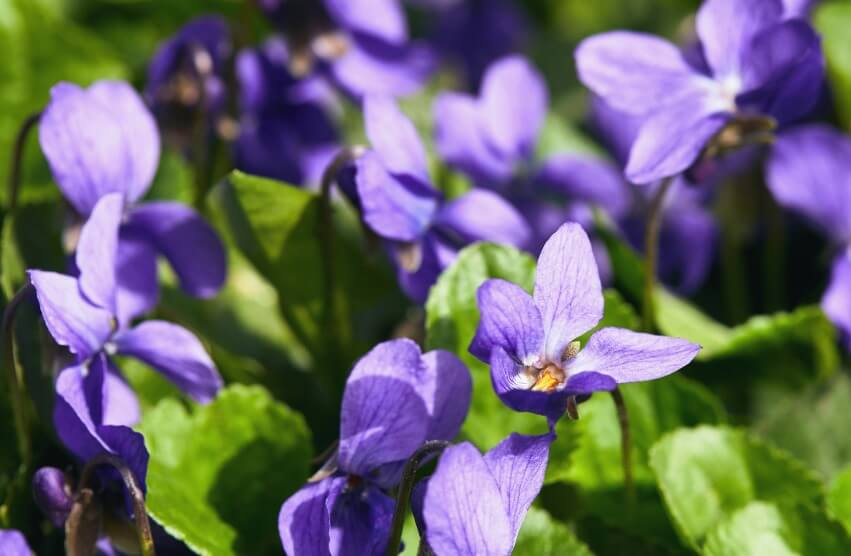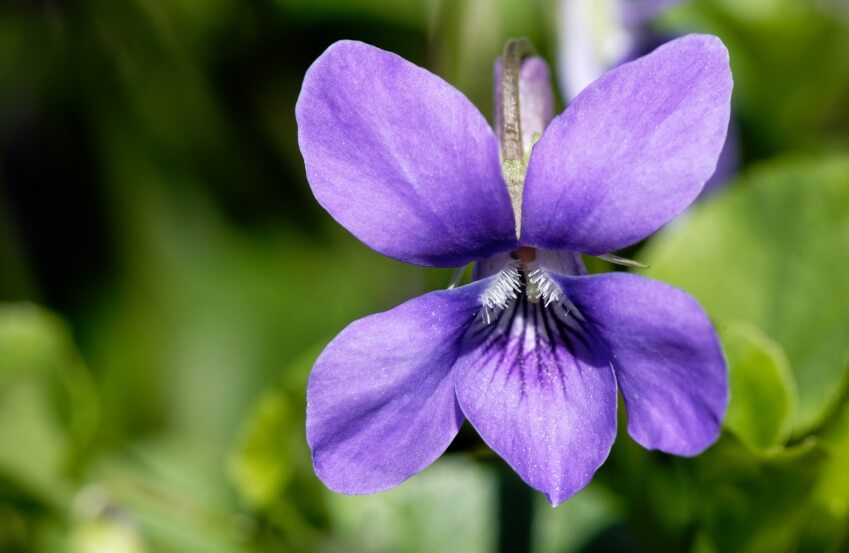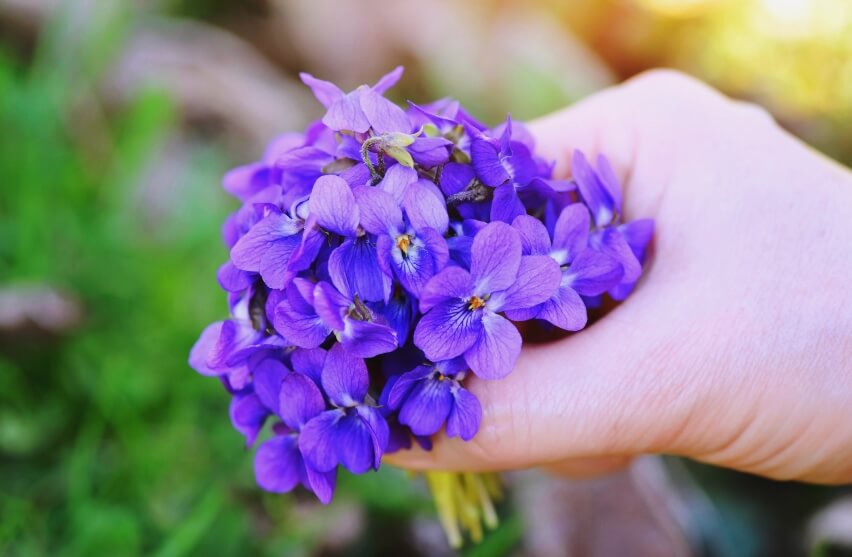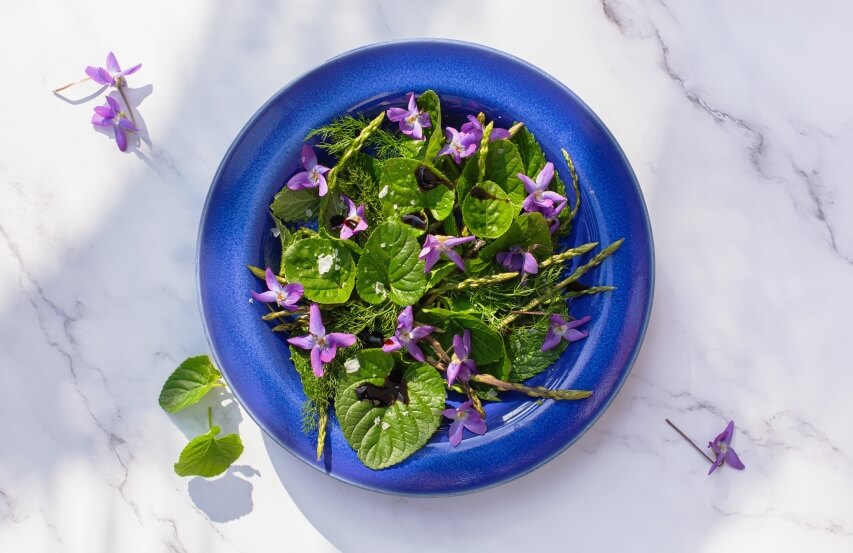Violets are not just a treat for the eyes; they hold a fascinating array of health benefits. These delicate flowers, often associated with love and fertility, have a light and joyful energy that’s hard to resist. With their delicate and sweet fragrance, it’s no surprise that they were in high demand for perfumes during the Victorian era, with France alone reportedly harvesting six tons of these beautiful blooms yearly. Beyond their enchanting scent and beauty, violets boast remarkable health benefits. In this article we will go through some of the most significant health benefits of Violets.
If you are interested in this topic, you can also read
<<Grape Leaf Benefits>> and <<Walnut Leaf Benefits>> articles.

About Violets
With over 100 species, many of which are native to North America, violets have a rich history in western herbalism. This makes them a valuable resource for natural remedies and wellness. Furthermore, violets have been historically recognized for their diverse uses, including as a key ingredient in traditional medicine for addressing various ailments. Their leaves and flowers have been utilized in teas, tinctures, and poultices, showcasing their versatility in promoting overall well-being [1].
Violet Health Benefits
Violet plants, particularly Viola odorata, commonly known as sweet violet, offer several various health benefits. Some of the most important health benefits of violets are as below:
Acts As A Pain Killer
Violets are a treasure trove of natural compounds, and one of their notable components is salicylic acid, which is akin to the pain-relieving ingredient found in aspirin. This fascinating attribute renders both the leaves and flowers of violets effective in alleviating headaches. The presence of salicylic acid underscores the potential of violets as a natural remedy for managing headache discomfort [2].
Good For Cold, Flu or even COVID-19
The leaves and flowers of Sweet Violet are endowed with gentle and beneficial properties that can aid in loosening chest congestion and easing coughs. Their abundant reserves of vitamin C and other beneficial compounds enable violets to effectively reduce inflammation in the lungs, leading to improved breathing and soothing relief from dry coughs.
Notably, these properties are especially beneficial for individuals dealing with asthma. With noteworthy levels of rutin and salicylic acid, which are akin to the composition of aspirin, violets play a valuable role in alleviating pain, body aches, and inflammation, thus proving to be beneficial in managing symptoms associated with flu and COVID-19. Furthermore, violets’ ability to induce sweating can contribute to reducing fever [3].
Supports Restful Sleep
In addition to their other remarkable benefits, violets can also play a part in promoting restful and peaceful sleep. Their inclusion in blends designed to induce gentle and soothing sleep can further enhance their potential in aiding relaxation and sleep quality [1].
Anti-inflammatory Effect
Violet, with its moist and cooling nature, offers relief from inflammation, both internally and externally. The leaves are known to ease inflammation and soothe skin irritations and swelling when used topically. Additionally, a syrup made from the flowers is particularly effective in soothing children’s coughs. Violet is also recognized for its pain-relieving properties, making it beneficial for alleviating pain associated with arthritis, especially in cases where dry hot tissues are present [4].
Heart Health
Violet, also known as hearts-ease, has a long history of being used to support both physical and emotional heart health. Rich in the compound Rutin, it strengthens capillaries, prevents platelet aggregation, and exhibits anti-inflammatory properties.
Rutin, a potent bioflavonoid found in violets, has been linked to improved blood circulation and enhanced flexibility in blood vessels. Notably, research indicates that Rutin can aid in preventing blood clots, thereby reducing the risk of heart attacks and strokes.
Additionally, the alkaloids present in Sweet Violet have a vasodilating effect, promoting relaxation in blood vessels and contributing to easier blood flow, which in turn helps in reducing blood pressure, a known contributing factor to heart disease [5].
Helps With Arthritis
Sweet Violet’s salicylic acid acts as a painkiller and anti-inflammatory agent, akin to the active ingredient in aspirin. This makes it effective in reducing painful joint inflammation and combating rheumatic pain [6].
Good For Skin
Sweet violet is a versatile skin ally, often applied directly to the skin for various skin disorders and as a gentle cleanser. Whether used as a poultice, compress, infused oil, or salve, violets offer soothing relief for dry or chafed skin, insect bites, eczema, abrasions, varicose veins, and hemorrhoids. Its cooling and anti-inflammatory properties make it a go-to natural remedy for a range of skin concerns [7].
Good For Mental Health
In the realm of mental well-being, sweet violet shines as a support for managing nervous strain, hysteria, physical and mental exhaustion, symptoms of menopause such as hot flashes, as well as feelings of depression and irritability. Its calming influence has been valued for generations in addressing a spectrum of emotional and psychological challenges [8].
Good For Digestive System
Violets extend their benefits to digestive health by addressing a variety of complaints, including abdominal pain, stomach and intestinal inflammation, digestion issues stemming from dietary habits, gas, heartburn, gallbladder disorders, and loss of appetite. This multi-faceted support can be a boon for those seeking natural remedies for digestive discomfort [9].
Respiratory System Health
When it comes to lung health, sweet violet is a valuable component in herbal combinations designed to alleviate breathing problems. From acute and chronic bronchitis to asthma, emphysema, respiratory tract inflammation, cold and flu symptoms, hoarseness, cough, and chest congestion, violets play a role in providing relief and promoting respiratory well-being [10].
Violet Benefits for Women
Violets are renowned for their ability to dissolve cysts, lumps, and fibrotic tissue in the breast. Doctors often recommend using a fresh poultice of violet leaves and flowers for cancers affecting the lymphatic system, breasts, lungs, and skin. The infusion of fresh violets in oil has been known to effectively dissolve breast lumps and can even serve as a preventive measure. This remarkable property makes violets a valuable natural ally for women’s health, especially in addressing various breast concerns [11].
Violet Nutritional Value
Violets boast a rich nutritional profile, containing significant amounts of Vitamin A and C, making them a valuable addition to a nutritive tea blended with other nutrient-dense herbs like Nettles and Alfalfa.
Furthermore, violets are a source of flavonoids, which are potent antioxidants known for protecting the body from damage caused by free radicals. The extensive list of metabolites found in violets includes mucilages, cyclotides, malic and ferulic acid, saponins, phytosterols, salicylic acid, anthocyanosides, flavonoids, coumarins, carotenoid pigments, alkaloids, and essential oils. This diverse array of compounds underscores the potential holistic benefits that violets can offer to women’s health and well-being [12].
Violet Side-Effects
While sweet violet is generally considered safe for consumption, it’s essential to be aware of potential side effects. These may include:
- Allergic Reactions: Some individuals may have allergic reactions to sweet violet, resulting in symptoms such as itching, hives, and difficulty breathing.
- Stomach Upset: Consuming large amounts of sweet violet may lead to stomach upset, including nausea and diarrhea.
- Skin Irritation: Applying sweet violet to the skin may cause irritation in some individuals.
It is crucial to consult with a healthcare professional before using sweet violet for medicinal purposes, especially if you have underlying health conditions or are taking medications [13].
How To Make A Violet Tea
To prepare a delightful and nutritious violet tea, steep 1 tablespoon of loose violet leaves in 16 ounces of boiling water for approximately 10 minutes. Afterward, strain the loose leaves from the jar. For a highly nutritious blend, consider combining equal amounts of dried leaves of dandelion, nettle, red clover, violet, and mint (peppermint or spearmint). Alternatively, you can combine violet leaves with blue vervain, linden leaf and flower, and elderflower for a tea that offers a soothing and refreshing sensation without sedating effects [14].
Edible Parts of Violet
Violets offer both culinary and decorative possibilities, with their leaves and flowers being edible and holding medicinal properties [15].
How to Eat Violet Flowers
Both the leaves and flowers of violets are edible and possess medicinal properties.
To harness the health benefits of violets, consider incorporating young leaves into delicious salads, while the mildly sweet flowers are traditionally candied and utilized as decorative accents. The delicate flavor of violets makes them a versatile addition to various dishes, including sauces, ice cream, syrups, and more.
Moreover, they can be enjoyed in pesto, sandwiches, wraps, and even stirred into soups to provide a nutrient-rich thickening agent. As a delightful garnish, violet flowers can be sprinkled on salads, incorporated into cakes and pancakes, or even candied or frozen into ice cubes for an elegant touch. It’s important to note that while the leaves and flowers are edible and offer a range of culinary possibilities, the roots of most violet species can cause nausea and vomiting and should not be consumed.












